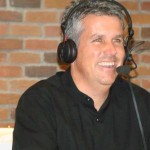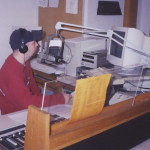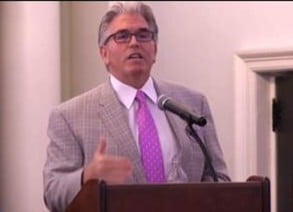It’s safe to say that there’s been a social media explosion over the past 10 years and chances are you’ve caught the bug. Each day we wake up and check our Facebook timelines and Twitter feeds before we even look at a website, listen to a radio station, watch a TV channel or god forbid open a newspaper (I actually know some people who still do it). This is a way of life for us and our listeners and given how many platforms launch and succeed each year, it doesn’t appear to be slowing down anytime soon.
If you scan the country today, you’ll find tons of sports radio personalities who are passionately engaged in these forums and take the responsibility of connecting very seriously. To list a few examples, Damon Bruce & John Middlekauff at 95.7 The Game-SF, Chad Doing at 750 The Game-Portland, Shan Shariff at 104.3 The Fan-Dallas and Chad Dukes & Grant Paulssen at 106.7 The Fan-Washington DC are just some of the on-air hosts who do a great job in this space.
 I’ll also catch guys like John Kincade at 680 The Fan-Atlanta, Bob Fescoe at 610 Sports-KC and Freddie Coleman at ESPN Radio use their Twitter feeds to drive radio teases and content tune-ins on their shows and I think that’s very smart. It certainly makes you wonder what they’re talking about and creates an urgency to want to click the station’s app button on your phone and hear what’s going on.
I’ll also catch guys like John Kincade at 680 The Fan-Atlanta, Bob Fescoe at 610 Sports-KC and Freddie Coleman at ESPN Radio use their Twitter feeds to drive radio teases and content tune-ins on their shows and I think that’s very smart. It certainly makes you wonder what they’re talking about and creates an urgency to want to click the station’s app button on your phone and hear what’s going on.
While there’s no denying the importance social media plays in our daily lives, there is some debate in the sports talk radio universe of how heavily invested we should be in it. While that may seem crazy to some of you, there’s some good reasoning offered on the other side to make for a great discussion.
Case in point, Mike Francesa of WFAN in New York has talked openly for the past few years about his lack of interest in it. Mike admits that he doesn’t have a Twitter or Facebook account and has no plans to adjust. He also doesn’t think athletes should be using the forum. There are plenty of other established major market personalities who share similar views.
Now some of you will dismiss that and say “he’s behind the times” or “he doesn’t get it” and maybe there’s some validity to that point of view but there’s equal value to the point he raises about giving things away for free in too many places and not making your radio show a unique one of a kind destination.
 Let’s face it, in the ratings world today it’s likely that a user with a PPM meter has a Facebook account. Maybe even a Twitter account. One could say that being active in both of these locations gives you a better chance to form a loyal bond with the individual which then makes them want to consume your show more.
Let’s face it, in the ratings world today it’s likely that a user with a PPM meter has a Facebook account. Maybe even a Twitter account. One could say that being active in both of these locations gives you a better chance to form a loyal bond with the individual which then makes them want to consume your show more.
The other side of that equation is that because the individual with a meter already knows what you think and has seen you interacting with everyone about it online, there’s no specific need now to tune into your radio show. It may seem far fetched but can you be so sure that isn’t accurate?
I myself have a Twitter, Facebook, Instagram and LinkedIn account and I believe there is great value in being accessible, connecting with people and staying involved in what the latest trends are but I do know that each medium has the ability to infect you like a virus and keep you so busy that you lose focus and decrease your own productivity.
Once you start letting the feedback consume you and ultimately influence you, you’re likely to hate it. That’s where social media can be really dangerous. I have watched hosts change segments based on a few tweets and I’ve seen them also spend hours going back and forth with 2-3 people who have no interest in having a good healthy discussion and are only interested in getting under their skin.
 I can recall in 2006 moving to St. Louis to program 590 The Fan, KFNS and before Twitter/Facebook became the powerful outlets for feedback that they are today, message boards were the popular thing. I was new to town and unfamiliar with them so I figured I’d better get up to speed since every host, producer and employee seemed consumed by one of my former colleagues Bernie Miklasz’s “Bernie’s Press Box” in the St. Louis Post-Dispatch.
I can recall in 2006 moving to St. Louis to program 590 The Fan, KFNS and before Twitter/Facebook became the powerful outlets for feedback that they are today, message boards were the popular thing. I was new to town and unfamiliar with them so I figured I’d better get up to speed since every host, producer and employee seemed consumed by one of my former colleagues Bernie Miklasz’s “Bernie’s Press Box” in the St. Louis Post-Dispatch.
Well before I knew it I found myself reading the board daily, hearing my staff talk about stuff from it and letting it influence their opinions. At one point I started to even question my own beliefs because I was working for a place which had made some bad decisions and the reaction to what I was involved in was strong and I felt I needed to be aware.
I finally woke up one day and thought to myself “what the hell am I doing“? While I couldn’t fix every single issue with the company, I knew I had to detach myself from that outlet because it was now causing me to not do what I was good at which was trust my gut.
Today, I use Twitter and I do engage at times with listeners and I’ve even been known to conduct special chat sessions or use the social media world for surveys and soliciting focus group participants. What I make sure not to do these days though is let it impact the way I think about my brand, my staff and any decision I make.
 For talent, that challenge is much harder. When you’re on a microphone communicating your position on every single sports topic, it’s going to lead to reaction. I’m a PD so I don’t have to endure the wrath of a half of a market when I speak my opinion about a sports topic but as a personality it comes with the territory. While I think it’s great to know that your words do connect with people, I think it’s equally wise to remember that a strong well informed opinion on a subject that has value to local people should create a response every single time! If you’re not creating a reaction then you’re likely just background noise.
For talent, that challenge is much harder. When you’re on a microphone communicating your position on every single sports topic, it’s going to lead to reaction. I’m a PD so I don’t have to endure the wrath of a half of a market when I speak my opinion about a sports topic but as a personality it comes with the territory. While I think it’s great to know that your words do connect with people, I think it’s equally wise to remember that a strong well informed opinion on a subject that has value to local people should create a response every single time! If you’re not creating a reaction then you’re likely just background noise.
The real key for on-air personalities is trying to strike a balance between being active and accessible yet not giving away the farm for free. People love to see you online during a game talking about it with them and you want to be able to provide some color on the game but saving the good stuff needs to factor into your thinking if you want to keep people interested and adjusting schedules to catch your show.
I do believe that the future of media personalities requires you to be much more than a radio host. In the future (and present) companies are going to expect you to be able to do a radio show, video commentary, write a blog, engage on social media, sell products, appear in the community and get out to games and build relationships with teams and fans.
 Some will bitch and moan “that’s a lot of work” or “it wasn’t like that back in the day” and much like with everything else in life, change happens. If I recall correctly, in the movie “Moneyball” Brad Pitt said it best “Adapt or Die“.
Some will bitch and moan “that’s a lot of work” or “it wasn’t like that back in the day” and much like with everything else in life, change happens. If I recall correctly, in the movie “Moneyball” Brad Pitt said it best “Adapt or Die“.
Ask someone in local television today who shoots their own video and does their own stand ups. Sure some will say “this is ridiculous” and “it wasn’t like this before” but the media industry will move on just fine without those who adapt and the list of people interested in this line of work will only increase.
The next part I want to touch on is the value or lack thereof of following people back and blocking them. Unless someone starts firing personal attacks or provides little benefit to me to engage with them, I usually refrain from blocking people. Once again though, I’m a PD and not an on-air personality. Some of the things that get sent to personalities today would make you sick to your stomach. I’ve seen it occur in multiple markets where things that were sent in were so over the line and being done so frequently that there could be grounds for an arrest for harassment.
 None the less, as a personality you’re in a no-win situation. Your opinions drive reactions and people will always have different viewpoints on everything you say and you’re in the public spotlight so the second you begin engaging in a confrontational way, it consumes your mind day/night and in most cases it just fuels the fire of people who’s sole purpose is to get under your skin. And if you react and take it too far? It could cost you your job.
None the less, as a personality you’re in a no-win situation. Your opinions drive reactions and people will always have different viewpoints on everything you say and you’re in the public spotlight so the second you begin engaging in a confrontational way, it consumes your mind day/night and in most cases it just fuels the fire of people who’s sole purpose is to get under your skin. And if you react and take it too far? It could cost you your job.
If you follow Keith Olbermann on Twitter you’ll see that he doesn’t hide from the negativity and at times he even welcomes it. While I don’t see a lot of benefit for KO in getting into twitter battles with viewers, I will say that I find his jabs very entertaining. In some ways I’m glad he does it because too many personalities get verbally abused and are then expected to not stand up for themselves.
The only areas of concern for me are “what is really being gained from it” and “is it worth it if a line gets crossed and some corporate executive or key client gets offended“? Let’s face it, we’re in a very sensitive world today and people presume you guilty a lot faster than they consider you innocent. That said, Olbermann’s responses are hysterical.
.@NickInTheNati I’ve had jobs for 35 years, little one. You have a twitter account. And not much of that.
While KO has his approach, Jay Mohr has a very different approach. I read an interview with him (click here) where he discussed his views on social media and what blew me away was when he talked about his strategy on positive and negative reactions.
 His exact quote was “The golden rule of Twitter is you cannot ever respond to somebody saying something negative to you. It took me a good three years to learn that, and, even still, I’ll start to type something and be a sentence or two in before I realize, What am I doing? Why am I answering this person? I’ve blocked about 3,000 people. I’ve made Twitter this ivory tower of Babel where people only say nice things about me.”
His exact quote was “The golden rule of Twitter is you cannot ever respond to somebody saying something negative to you. It took me a good three years to learn that, and, even still, I’ll start to type something and be a sentence or two in before I realize, What am I doing? Why am I answering this person? I’ve blocked about 3,000 people. I’ve made Twitter this ivory tower of Babel where people only say nice things about me.”
Here’s Jay, a popular public figure doing a daily show and expected to be accessible and yet he’s shutting down future communications with more than 3,000 people. Is that really wrong though? For his own peace of mind I bet he’s much happier opening his twitter account each day and not dealing with a ton of negativity. That probably puts him in a better frame of mind to be creative and do a great show and if he’s blocking people who don’t enjoy what he does anyway, are they really the fans who you want to focus your energy on anyway?
You can also make the case that by only promoting the positive, it creates the illusion that everyone likes Jay and his show and that can often create a domino effect where others feel like they need to start getting familiar with what’s happening on the show so they don’t feel left out. That’s one of the simple rules of marketing, say something enough times and people will start repeating it.
If you take it one step further, look at brands in general. Some feel strongly about following back listeners and some don’t. Some will post station only content benefits and some will respond to listeners messages. As a good brand example, I personally think the airline industry does a great job of responding to their customers. They’re very timely and often witty and I’m sure they see great value in it.
Get hurt. Try to fly back home and mechanical issues. Awesome. @AmericanAir
@joshreddick16 Our apologies for the delay, Josh. We’ll do what we can to keep our plane off the #disabledlist. What’s your flight number?
One big challenge we have today in our business with social media is trying to keep up with the thousands of responses per day while putting the responsibility on staff members who are also trying to balance doing 2-3 other jobs. Yes the interaction is very important and we don’t want to be dismissive of our audience but if the on-air product suffers from it, is it worth it? At that point you’re choosing between sipping two different poisons. Either way you’re in trouble.
I’ll close with this. If you’re not on Twitter today, you’re missing out on knowing about breaking news. Whether you love the service or not, if you’re not aware of what’s going on there you’re missing key information that matters to your audience. Every single reporter across the country is breaking news on Twitter before they do it on their ow company’s platforms and while that boggles my mind and one could question why, this is how the news cycle works in today’s environment and you need to be where the action is.
 I do think one key takeaway from Mike Francesa’s views on social media is valid – are you giving away your best material for free and leaving nothing unique and special for your show? If your best stuff is left on Twitter or you’re recycling the same exact lines from the night before, you may want to alter your approach. For more on his views on the subject, watch his keynote address on the sports talk radio industry by clicking here.
I do think one key takeaway from Mike Francesa’s views on social media is valid – are you giving away your best material for free and leaving nothing unique and special for your show? If your best stuff is left on Twitter or you’re recycling the same exact lines from the night before, you may want to alter your approach. For more on his views on the subject, watch his keynote address on the sports talk radio industry by clicking here.
That said I believe there’s great personal and promotional value for personalities and it’s a smarter long-term strategy for your career to be accessble and active in social locations where fans are. It’s certainly not for everybody but I see more upside being there than downside for not but that’s just my point of view.
I’ll leave you to consider this. Mike Francesa has no connection in any social space and yet he’s been (and still is) one of the highest rated performers in the #1 media market in the country. Maybe he’s missing out on what’s important to people today and he’s not thinking about what’s going to matter tomorrow but given his track record of success, he might not be as crazy as you might think. I’ll let you be the judge!
How do you feel about the importance of social media and how active personalities and sports radio professionals should be? Leave a comment below to continue the conversation!

Jason Barrett is the Founder and CEO of Barrett Media. The company launched in September 2015 and has provided consulting services to America’s top audio and video brands, while simultaneously covering the media industry at BarrettMedia.com, becoming a daily destination for media professionals. Prior to Barrett Media, Jason built and programmed 95.7 The Game in San Francisco, and 101 ESPN in St. Louis. He was also the first sports programmer for SportsTalk 950 in Philadelphia, which later became 97.5 The Fanatic. Barrett also led 590 The Fan KFNS in St. Louis, and ESPN 1340/1390 in Poughkeepsie, NY, and worked on-air and behind the scenes at 101.5 WPDH, WTBQ 1110AM, and WPYX 106.5. He also spent two years at ESPN Radio in Bristol, CT producing ‘The Dan Patrick Show’ and ‘GameNight’. JB can be reached on Twitter @SportsRadioPD or by email at Jason@BarrettMedia.com.








